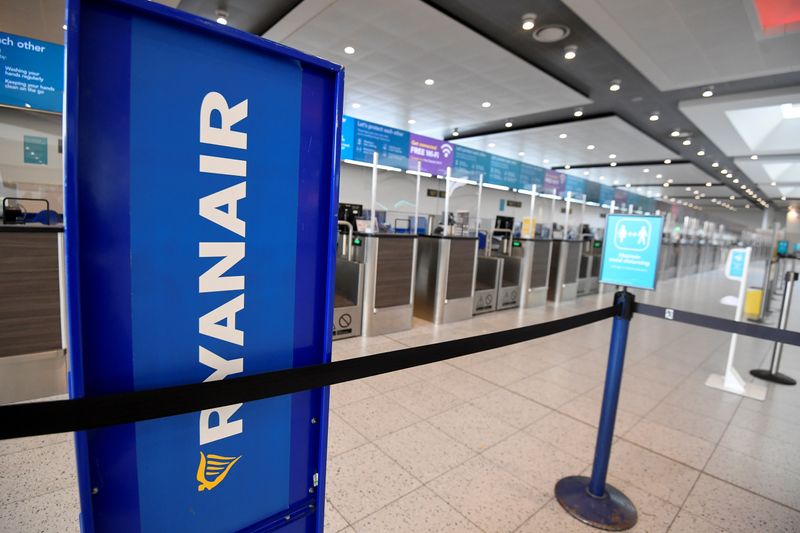By Ben Klayman
(Reuters) -Pandemic-weary corporations struggled to assess the impact of the new Omicron variant of the coronavirus on Monday, with industries from Hollywood movie studios to airlines and autos awaiting more details to help determine how it might affect their operations and profits.
The World Health Organization warned on Monday the Omicron variant carries a very high global risk of infection surges. Spooked investors wiped roughly $2 trillion off global stocks on Friday, but markets regained some ground on Monday.
Countries have swiftly imposed bans on travel from southern Africa, where the variant was first uncovered. Japan and Israel went even further, announcing bans on all foreign visitors.
Some airlines said they were not heavily changing schedules, but industry sources said big carriers moved swiftly to protect their hubs by curbing passenger travel from southern Africa.
Ryanair Chief Executive Michael O'Leary saw no reason to cancel flights although he was worried about some countries potentially shutting air travel. Lufthansa, Germany's flagship airline, said its flights were still well booked.
U.S. President Joe Biden met with chief executives of major retailers and other companies on Monday to discuss how to move goods to shelves as the U.S. holiday shopping season begins in the shadow of Omicron.
Before the meeting, Walmart (NYSE:WMT) CEO Doug McMillon cited improvement in the supply chain, noting the retailer had seen a 26% increase in shipping containers going through U.S. ports over the past four weeks.
U.S. Commerce Secretary Gina Raimondo said on Monday it was too soon to tell if Omicron will have any impact on global supply chains.
The prospect of a fast-spreading variant has raised fears of a return of the sort of restrictions that shut down a swathe of industries in 2020.
In Hollywood, where production on film and television shows returned to pre-pandemic levels this summer thanks to stringent health and safety precautions, the studios were waiting to learn more about this latest mutation of the coronavirus.
"With COVID, it keeps shape shifting. It's like mercury -- we can't get our hands around it," said Dr. Neal Baer, a physician who was a longtime producer of "Law & Order: Special Victims Unit."
"It's going to take a couple of weeks for us to know, one, how well vaccinations protect us, two, whether you need a booster and whether a booster helps or three, whether the vaccine needs to be modified to make it effective against this mutation."
Movie theater attendance has been returning in fits and starts since the summer, but a spokesman for the National Association of Theatre Owners said variants remain a concern -- especially after the pullback in attendance that accompanied the Delta variant.
In the United States, auto plants were closed for two months last year. Even after automakers restarted operations, they have curtailed production schedules due to semiconductor chip shortages and other supply-chain constraints. Automakers said it was too soon to predict the impact of Omicron.
"This is new," Nissan (OTC:NSANY) Motor Co's U.S. spokeswoman Lloryn love-Carter said. "We're monitoring of course, but we still have a lot of pretty strict COVID protocols in place."
General Motors Co (NYSE:GM), the largest U.S. automaker, said it was watching closely and its COVID-19 safety protocols remain in place at its plants.
"We continue to strongly encourage our employees to get vaccinated given the broad availability of safe and highly efficacious vaccines," GM spokeswoman Maria Raynal said in an email. "We will continue to review and adjust our protocols as new information regarding this variant becomes available."

Toyota Motor (NYSE:TM) Corp said its U.S. management team will meet on Tuesday to discuss the Omicron variant.
"Right now we're in the 'gathering info' mode," Toyota's U.S. spokesman Scott Vazin said. "Since most of our employees are based in plants, we've never stopped COVID protocols such as social distancing, health screenings, masking up."